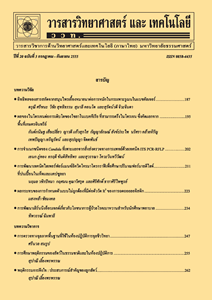พีจีพีอาร์ : บทบาทในการส่งเสริมและป้องกันพืชภายใต้สภาวะเครียด
Main Article Content
Abstract
บทคัดย่อ
ความเครียดจากสิ่งไม่มีชีวิตและมีชีวิต เช่น ความเค็ม ความแห้งแล้ง น้ำท่วม โลหะหนัก และเชื้อโรคพืช เป็นปัญหาที่สำคัญของการทำเกษตรกรรม ก่อให้เกิดความเครียดออกซิเดชันและการสะสมเอทิลีนในพืช ส่งผลทำให้เกิดความเสียหายอย่างมากต่อการเจริญเติบโตและผลผลิต อย่างไรก็ตาม การเจริญเติบโตของพืชภายใต้สภาวะเครียดสามารถปรับปรุงได้ด้วยการใช้แบคทีเรียที่เป็นประโยชน์ต่อพืช ในกลุ่มของไรโซแบคทีเรียช่วยส่งเสริมการเจริญ เติบโตของพืชหรือพีจีพีอาร์ (PGPR, plant growth promoting rhizobacteria) ซึ่งมีสมบัติในการส่งเสริมและป้องกันพืชผ่านกลไกทั้งทางตรงและทางอ้อม โดยการผลิตฮอร์โมนพืช ละลายธาตุอาหาร ควบคุมการดูดซึมสารอาหาร และชักนำระบบความต้านทานในพืช นอกจากนี้พีจีพีอาร์ยังสามารถสร้างเอนไซม์ 1-aminocyclo-propane-1-carboxylate (ACC) deaminase เพื่อย่อยสลาย ACC ซึ่งเป็นสารตั้งต้นของวิถีการสังเคราะห์เอทิลีน ทำให้ระดับเอทิลีนในพืชลดน้อยลง บทความนี้ได้กล่าวถึงการปรับตัวของพืชและประสิทธิภาพของพีจีพีอาร์ในการเพิ่มการเจริญเติบโตของพืช และกลไกที่สำคัญในการป้องกันพืชภายใต้สภาวะเครียด รวมถึงความข้อบกพร่องของการประยุกต์ใช้พีจีพีอาร์เพื่อเป็นแนวทางในการศึกษาวิจัยและพัฒนาปรับปรุงพืชให้ทนทานต่อความเครียดได้
คำสำคัญ : พืช; สภาวะเครียด; ไรโซแบคทีเรีย; แบคทีเรียส่งเสริมการเจริญเติบโตของพืช
Abstract
Both abiotic and biotic stresses such from salinity, drought, flooding, heavy metals and plant pathogens are an important problem for agricultural production. Stress conditions cause oxidative stress and ethylene accumulation which result severe damage to plant growth and productivity. However, plant growth under stress conditions could be improved by applying beneficial bacteria such as plant growth promoting rhizobacteria (PGPR) that support and protect plant growth performance by means of direct and indirect mechanisms. PGPR can promote plant growth by producing phytohormone, solubilizing nutrients, controlling nutritional uptake and inducing resistance against plant pathogens. Many PGPR also contain the ACC-deaminase that cleaves ACC, the immediate stress ethylene precursor, which allows lowering ethylene level. This review discussed the plant adaptation to overcome the negative impact of stresses and the efficiency of PGPR to enhance and protect plants under stressful environments. Weakness of the PGPR application was also discussed comprehensively for further research and development of the new plant species to endure against stress situations.
Keywords: plant; stress condition; rhizobacteria; plant growth promoting rhizobacteria (PGPR)


